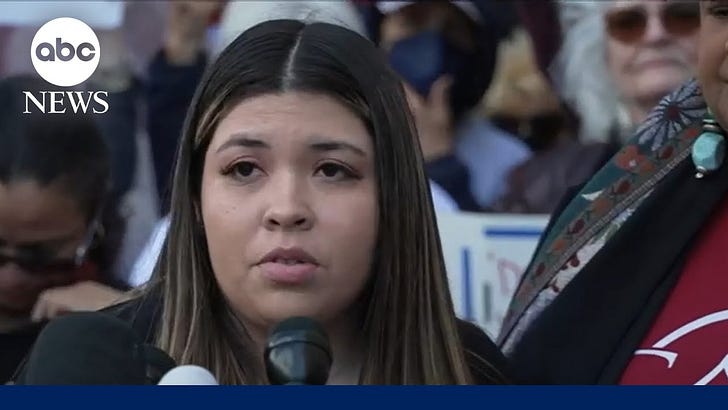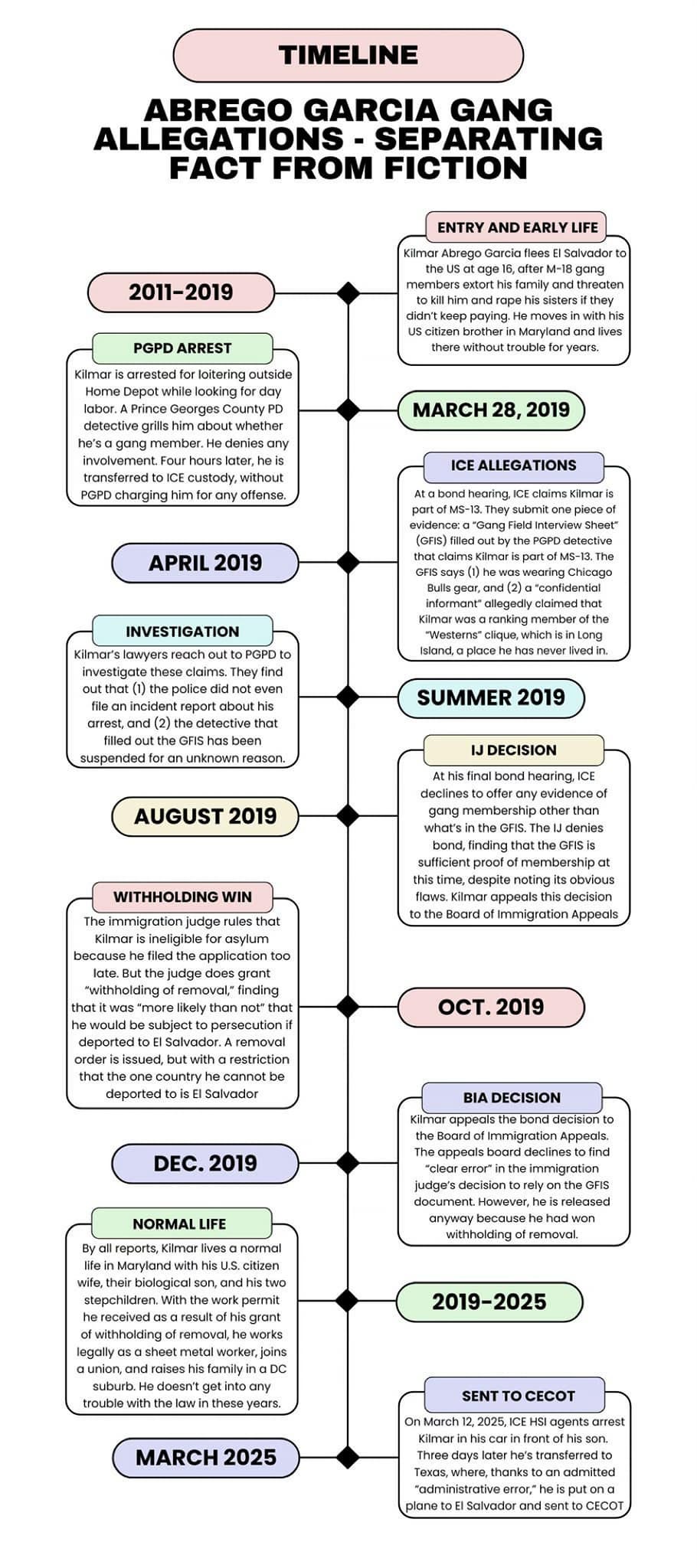Guest Editorial: Kilmar Armando Abrego Garcia must be returned to the United States without further delay.
"The big picture is quite frightening for American democracy."
by Wendy Holtzman
Editor’s Note: We believe most Chronicle readers are familiar, at least to some extent, with the case of Kilmar Armando Abrego Garcia, who last month was mistakenly (by the government’s own admission) deported to a facility in El Salvador well known for its brutal conditions. The U.S. Supreme Court, in a 9 to 0 decision handed down on April 10, directed the government to “facilitate” his return to the United States. The case is currently under review by U.S. District Judge Paula Xinis of the U.S. District Court for the District of Maryland. Yesterday, April 15, Judge Xinis granted expedited discovery to Abrego Garcia’s legal team, that is, she allowed them to obtain documents and conduct depositions with government officials to see what they had actually done to try to bring him back to the United States.
In the following opinion piece, a Chronicle contributor makes the moral arguments for his immediate return to the U.S. For a very detailed and well reported timeline of Abrego Garcia’s odyssey, please see this link.
Kilmar Abrego Garcia immigrated to the United States in 2011 from El Salvador at the age of 16, because a gang that was trying to extort money from his family’s business had threatened him.
In 2019, during the first Trump administration—although Abrego Garcia had no criminal record—he was arrested on immigration offenses and accused of being an MS-13 gang member. When an immigration judge heard no evidence of any gang affiliation and heard Abrego Garcia’s personal story, the judge issued a ruling saying he must never be deported to El Salvador.
Since 2019, as he was instructed to do, Abrego Garcia checks in yearly with ICE. The Department of Homeland Security even issued him a work permit. He is also now married to a US citizen, has three children—all of whom have various disabilities —and is working in construction. As of March 12, he has been employed full time as a first-year sheet metal apprentice, and he is pursuing his vocational license at the University of Maryland.
On that same March day, he was detained and once again accused of gang affiliation. However, this time he received no due process and was deported to a notoriously inhumane, dangerous prison in the one country the judge prohibited him from being sent to—El Salvador!
In court, the administration admitted to Judge Paula Xinis that they made a mistake in deporting Abrego Garcia to El Salvador. Due to “well-founded fear of future persecution” the judge ordered the government to return him to the US. The government maintains that there is nothing they can do to get him back. They appealed to the federal court of appeals, which unanimously upheld the lower court’s ruling. They then appealed to the Supreme Court, which unanimously ruled that, yes, the government must facilitate his return.
All these rulings support the idea that, of course, the President of the most powerful country in the world can get this man returned if he wants to. Also, if necessary—but probably unnecessary—the US has a likely bargaining chip. We are paying $6 million to El Salvador to incarcerate hundreds of deported immigrants in their brutal prison.
Last Friday, because the government is obviously not acting in good faith, Judge Xinis demanded that the administration update her daily about the steps they are taking to return Abrego Garcia. On Tuesday April 15, Judge Xinis, disgusted that the government has flouted her orders regarding efforts about Abrego Garcia’s return, she again insisted on daily updates. The saga of this tragedy of Kilmar Abrego Garcia and the Trump administration’s defiance continues.
Additionally, many constitutional scholars agree with the judicial rulings in this case. The dangerous precedent being set here is the administration’s contention that the president has unlimited powers to do what he wants in foreign affairs; on Sunday the government essentially told the judge just that. The obstacle for Trump is that we still have a 5th amendment which guarantees due process to all people in the United States.
“The fact that the president has foreign affairs authority implied in the Constitution doesn't supersede that core foundational constitutional right that's guaranteed in the plain language of the Constitution," said University of Baltimore School of Law professor, Kim Wehle.
The big picture is quite frightening for American democracy. Basically the administration’s legal logic is — by invoking its foreign powers — there’s nothing that could prohibit the government from picking up an American citizen off the street, sending her to a violent prison in another country where torture is routine, conceding it made a mistake, but maintaining it won’t do anything to correct the situation and that no law or judge can prevent this. Consequently, she’s going to spend the rest of her days imprisoned in a gulag.
Wendy Holtzman is a Chronicle reader who lives in Peekskill. She is a retired NYC public elementary school teacher who is enjoying the time she now has for reading, art, and her grandchildren.
*********************************************************************************************************
Editor’s Note:The Chronicle welcomes the diverse viewpoints of local residents. We normally publish them uncut, unedited, and in front of the paywall. Guest Editorials can range up to 3000 words. To discuss a possible submission, please contact us at TheCrotonChronicle@gmail.com
To share this post, or to share The Croton Chronicle, please click on these links.
Comments policy: No hate speech or personal attacks, please be polite and respectful.





The Trump administration’s insistence on ensuring Abrego Garcia does not return to the U.S is an indication that perhaps the U.S. is funding something like a concentration camp in El Salvador and they are eager to cover that up.
Excellent piece. I look forward to reading more from Holtzman.